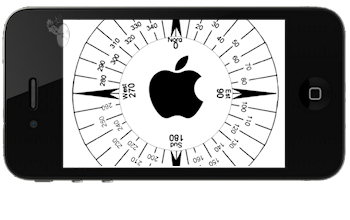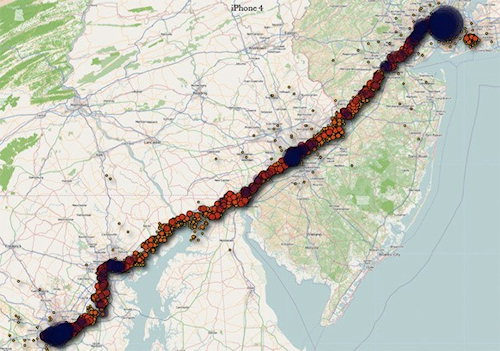
Apple forklarer nu hvad bigbrother databasen i iPhone er. Det er slet ikke telefonens positioner som gemmes.
Det har været noget af en mediestorm mod Apple, siden to ingeniører fandt en skjult database i iPhone som gemte på koordinater.
Apple træder nu frem, og forklarer hvad databasen i iPhone er. Det er ikke koordinater over hvor iPhonen har været, men derimod koordinater over WiFi hotspots og mobilmaster i nærheden af hvor telefonen har været.
Det forklarer ujævnhederne i den rute som de to ingeniører plottede ind for en togtur.

Apple forklarer
Apple forklarer at iPhone ikke logger telefonens position. Derimod vedligeholdes en database over Wi-Fi hotspots og mobilmaster som telefonen kan se. Nogle af dem kan være op til 160 km væk fra telefonen. Databasen hjælper telefonen til hurtigere at beregne sin position når der bedes om det.
Årsagen til dette er at en GPS beregning af telefonens nøjagtige placering kan tage op til flere minutter. Denne tid kan reduceres til få sekunder, ved at bruge placeringen af kendte Wi-Fi punkter og mobilmaster i området. Fordelen er ydermere, at telefonen kan beregne sin position indendørs og i kældre mv. hvor der ingen GPS dækning er.
Disse beregninger foregår realtime i telefonen, baseret på oplysninger i en central database over Wi-Fi hotspots og mobilmaster. Denne database vedligeholdes ud fra oplysningerne, som alle iPhones indsamler og videresender anonymt til Apple. Det er ikke muligt at identificere telefonens bruger ud fra de data.
Apple ændrer iOS
Apple anerkender dog, at databasens størrelse og den tid data gemmes kan være problematisk.
De udsender derfor indenfor få uger en opdatering til iOS, som tilføjer følgende:
- Reducerer størrelsen på den lokale database over Wi-Fi hotspots og mobilmaster
- Ekskluderer databasen fra backups af telefonen
- Sletter hele databasen, når Location Services slås fra i telefonen.
Apple press release
1. Why is Apple tracking the location of my iPhone?
Apple is not tracking the location of your iPhone. Apple has never done so and has no plans to ever do so.
2. Then why is everyone so concerned about this?
Providing mobile users with fast and accurate location information while preserving their security and privacy has raised some very complex technical issues which are hard to communicate in a soundbite. Users are confused, partly because the creators of this new technology (including Apple) have not provided enough education about these issues to date.
3. Why is my iPhone logging my location?
The iPhone is not logging your location. Rather, it’s maintaining a database of Wi-Fi hotspots and cell towers around your current location, some of which may be located more than one hundred miles away from your iPhone, to help your iPhone rapidly and accurately calculate its location when requested. Calculating a phone’s location using just GPS satellite data can take up to several minutes. iPhone can reduce this time to just a few seconds by using Wi-Fi hotspot and cell tower data to quickly find GPS satellites, and even triangulate its location using just Wi-Fi hotspot and cell tower data when GPS is not available (such as indoors or in basements). These calculations are performed live on the iPhone using a crowd-sourced database of Wi-Fi hotspot and cell tower data that is generated by tens of millions of iPhones sending the geo-tagged locations of nearby Wi-Fi hotspots and cell towers in an anonymous and encrypted form to Apple.
4. Is this crowd-sourced database stored on the iPhone?
The entire crowd-sourced database is too big to store on an iPhone, so we download an appropriate subset (cache) onto each iPhone. This cache is protected but not encrypted, and is backed up in iTunes whenever you back up your iPhone. The backup is encrypted or not, depending on the user settings in iTunes. The location data that researchers are seeing on the iPhone is not the past or present location of the iPhone, but rather the locations of Wi-Fi hotspots and cell towers surrounding the iPhone’s location, which can be more than one hundred miles away from the iPhone. We plan to cease backing up this cache in a software update coming soon (see Software Update section below).
5. Can Apple locate me based on my geo-tagged Wi-Fi hotspot and cell tower data?
No. This data is sent to Apple in an anonymous and encrypted form. Apple cannot identify the source of this data.
6. People have identified up to a year’s worth of location data being stored on the iPhone. Why does my iPhone need so much data in order to assist it in finding my location today?
This data is not the iPhone’s location data-it is a subset (cache) of the crowd-sourced Wi-Fi hotspot and cell tower database which is downloaded from Apple into the iPhone to assist the iPhone in rapidly and accurately calculating location. The reason the iPhone stores so much data is a bug we uncovered and plan to fix shortly (see Software Update section below). We don’t think the iPhone needs to store more than seven days of this data.
7. When I turn off Location Services, why does my iPhone sometimes continue updating its Wi-Fi and cell tower data from Apple’s crowd-sourced database?
It shouldn’t. This is a bug, which we plan to fix shortly (see Software Update section below).
8. What other location data is Apple collecting from the iPhone besides crowd-sourced Wi-Fi hotspot and cell tower data?
Apple is now collecting anonymous traffic data to build a crowd-sourced traffic database with the goal of providing iPhone users an improved traffic service in the next couple of years.
9. Does Apple currently provide any data collected from iPhones to third parties?
We provide anonymous crash logs from users that have opted in to third-party developers to help them debug their apps. Our iAds advertising system can use location as a factor in targeting ads. Location is not shared with any third party or ad unless the user explicitly approves giving the current location to the current ad (for example, to request the ad locate the Target store nearest them).
10. Does Apple believe that personal information security and privacy are important?
Yes, we strongly do. For example, iPhone was the first to ask users to give their permission for each and every app that wanted to use location. Apple will continue to be one of the leaders in strengthening personal information security and privacy. |
Kilde: MacRumors.com















